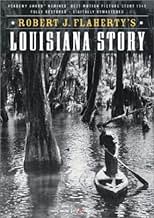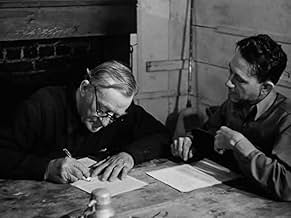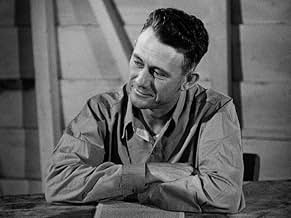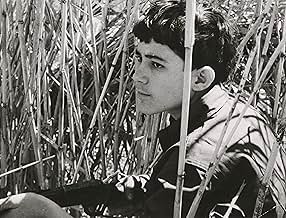Louisiana Story
- 1948
- Tous publics
- 1h 18m
IMDb RATING
6.4/10
2.3K
YOUR RATING
The idyllic life of a young Cajun boy and his pet raccoon is disrupted when the tranquility of the bayou is broken by an oil well drilling near his home.The idyllic life of a young Cajun boy and his pet raccoon is disrupted when the tranquility of the bayou is broken by an oil well drilling near his home.The idyllic life of a young Cajun boy and his pet raccoon is disrupted when the tranquility of the bayou is broken by an oil well drilling near his home.
- Director
- Writers
- Stars
- Nominated for 1 Oscar
- 4 wins & 3 nominations total
- Director
- Writers
- All cast & crew
- Production, box office & more at IMDbPro
Featured reviews
Having lived many years in Acadiana, I can tell you that this is a beautiful depiction of the immense grace of the area during the forties. The film is not great drama, but the mystery and immense beauty of the bayou is authentic. Joseph Boudreaux, the boy in the movie will melt your heart with his lovely presence and Cajun ways.
Thankfully, this film was placed in the archives of the National Library of Congress in the nineties. The restoration is exquisite! I, for one, am thankful that this monumental tribute to the true Cajun people, as they once were, has been resurrected.
Much of what you will see in this film is, sadly, gone forever. There will never be another tribute to Acadiana like Louisiana Story!
Thankfully, this film was placed in the archives of the National Library of Congress in the nineties. The restoration is exquisite! I, for one, am thankful that this monumental tribute to the true Cajun people, as they once were, has been resurrected.
Much of what you will see in this film is, sadly, gone forever. There will never be another tribute to Acadiana like Louisiana Story!
The opening scenes paint an idyllic picture of nature as well as the relationship it shares with people. With vegetation reflected off the surfaces of ponds, animals roaming about, and the sounds of nature in the background, the bayou feels like a slice of heaven. Even the people who occupy this land don't disrupt the environment since they appear to be one with nature. This is until we're introduced to the threat of industrialization. It starts with the boy (he's referred to as Alexander in the opening, but he's credited as "The Boy" in the film) being knocked into the water due to the wake of a motorboat. We then see an oil tower poking through some trees in the background. The interference of industrialization keeps spiraling until we're introduced to an oil well. With smog being released from its exhaust pipes and the sounds of its machinery being audible throughout much of the bayou, it seems out of place and sacrilegious.
The more one watches the film though, it becomes readily apparent that we're watching a glorification of the oil industry since the film refuses to properly acknowledge the problems it causes to the bayou. You're clearly asked to support the oil well, but given the glaring issues it causes (in addition to the real-world negative effects oil drilling has on the environment), this puts the film at odds with itself. Coming mainly from the perspectives of the working man and those impacted by the oil well, the potential for a great critique on industrialization is there, but we're instead left with an incongruity between the depiction and the endorsement of the industry. Flaherty was commissioned by Standard Oil to make the film though, so it's no surprise that it's propaganda.
The best parts of the film concern the boy's trials within the bayou. As idyllically shot as the bayou is, we're constantly reminded of the danger some of the wildlife poses, specifically in regards to an alligator which recurs throughout the film. Its scenes are memorable, with the standout being a middle scene where the boy attempts to catch it. That scene is tense, but Flaherty was undoubtedly a madman when shooting it. Boudreaux's and the alligator's scenes weren't recorded separately or anything. Rather, they were in fairly close proximity to each other, thus putting Boudreaux in actual danger when that scene was shot. As a result, the suspense in that sequence concerns worrying about real-life harm coming to the actor. To be clear, I don't approve of this as it's clearly child endangerment, but on a gut level, it made for a certain kind of thrill which left a visceral impact on me.
Overall, it's fairly interesting and I enjoyed it in some respects, but the propagandistic elements made it feel like a missed opportunity.
The more one watches the film though, it becomes readily apparent that we're watching a glorification of the oil industry since the film refuses to properly acknowledge the problems it causes to the bayou. You're clearly asked to support the oil well, but given the glaring issues it causes (in addition to the real-world negative effects oil drilling has on the environment), this puts the film at odds with itself. Coming mainly from the perspectives of the working man and those impacted by the oil well, the potential for a great critique on industrialization is there, but we're instead left with an incongruity between the depiction and the endorsement of the industry. Flaherty was commissioned by Standard Oil to make the film though, so it's no surprise that it's propaganda.
The best parts of the film concern the boy's trials within the bayou. As idyllically shot as the bayou is, we're constantly reminded of the danger some of the wildlife poses, specifically in regards to an alligator which recurs throughout the film. Its scenes are memorable, with the standout being a middle scene where the boy attempts to catch it. That scene is tense, but Flaherty was undoubtedly a madman when shooting it. Boudreaux's and the alligator's scenes weren't recorded separately or anything. Rather, they were in fairly close proximity to each other, thus putting Boudreaux in actual danger when that scene was shot. As a result, the suspense in that sequence concerns worrying about real-life harm coming to the actor. To be clear, I don't approve of this as it's clearly child endangerment, but on a gut level, it made for a certain kind of thrill which left a visceral impact on me.
Overall, it's fairly interesting and I enjoyed it in some respects, but the propagandistic elements made it feel like a missed opportunity.
10Huron
Robert Flaherty had a great eye for the interesting shots. Never more so than this oil company funded film about a young boy seeing the oil rig come to his Louisiana bayou. Although there is not much of a story the shots of the oil rig, life in the bayou, and the moods that Flaherty captures make it a film well worth seeing. If you see "Man of Aran" or "Nannok of the North" remember it was the same great documentary filmmaker. I've seen it twice and probably will see it again someday.
10tavm
Under the heading "Louisiana" I checked this documentary called Louisiana Story by Robert J. Flaherty out of curiosity from my local East Baton Rouge Parish Library. Beautiful views of the state swamps as well as fascinating scenes of the oil rig that inhabits them dominates the film which depicts the adventures of a Cajun boy on a boat fishing and hunting alligators with his pet raccoon. His father occasionally comes along for the ride and they both have friendly relations with the workers of the oil well. There are some scenes of the mother as well. Great Pulitzer Prize-winning music scored by Virgil Thomson is beautifully performed by The Philadelphia Symphony Orchestra as conducted by Eugene Ormandy. Wonderful cinematography by Richard Leacock. Worth checking out as a depiction of late '40s Louisiana as well as the final film of Mr. Flaherty before his death in 1951. Update-4/29/07: The Cajun boy that starred in this film, J.C. Boudreaux, is now 73 and lives with his wife of 55 years, Regina, in a FEMA trailer in the town of Sweet Lake which is south of Lake Charles. They moved there after Hurricane Rita destroyed their home in Cameron. They had seven children who have provided them numerous grand-and great-grandchildren. Boudreaux still loves fishing. I found this out reading this morning's The (Baton Rouge) Advocate.
A Cajun boy is fishing and hunting with his pet raccoon out in the Louisiana bayou. He comes upon a crew of oil drillers and has various adventures.
This was Oscar nominated for writing which is probably the least compelling part of this movie. It can be argued that there is barely any writing involved. Its strength is the sense of reality in the swamp and the oiler crew. It's a slice of life. It's the docu-style of filmmaking. The kid may not be a great actor but he has realism on his side. There are some great scenes. I can't forget the raccoon and it's great to see a real drilling crew working. The plot isn't much. It's really just a series of swamp adventures.
This was Oscar nominated for writing which is probably the least compelling part of this movie. It can be argued that there is barely any writing involved. Its strength is the sense of reality in the swamp and the oiler crew. It's a slice of life. It's the docu-style of filmmaking. The kid may not be a great actor but he has realism on his side. There are some great scenes. I can't forget the raccoon and it's great to see a real drilling crew working. The plot isn't much. It's really just a series of swamp adventures.
Did you know
- TriviaStandard Oil of New Jersey (became Exxon in 1972 and Exxon/Mobil in 1999) contributed $258,000 to the film's production. Although the company had no rights and no identification in the film, it stood "to get across the idea that oil companies are beneficently public-spirited, their employees honest, industrious and amiable, and their operations productive and innocuous." According to a modern source, Robert J. Flaherty's contract with Standard Oil insured that all of the film's profits went to him. The only connection was that Humble Derrick No. 1 is mentioned - and the Humble Oil Co. was 50% owned by Standard Oil of New Jersey at the time.
- GoofsIn the opening sequence, when The Boy first spots the raccoon, his hair is neat. Then it's mussed. Then it's neat again.
- ConnectionsFeatured in Studies for Louisiana Story (1965)
- How long is Louisiana Story?Powered by Alexa
Details
Box office
- Budget
- $258,000 (estimated)
- Runtime1 hour 18 minutes
- Color
- Aspect ratio
- 1.37 : 1
Contribute to this page
Suggest an edit or add missing content




















